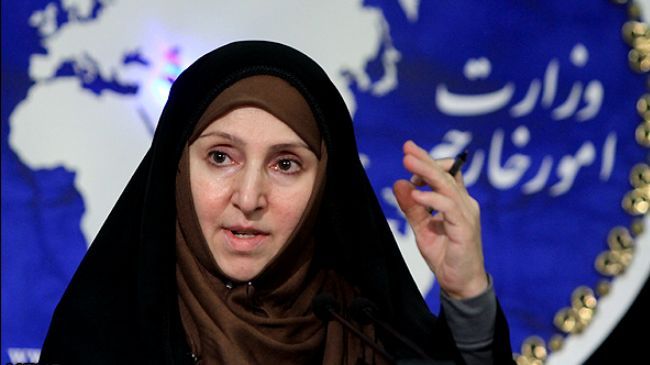Iran says it expects no change in Israel’s policies following the recent general elections since all the regime’s parties follow the same aggressive approach.
Speaking at her weekly press conference on Wednesday, Foreign Ministry Spokeswoman Marzieh Afkham said that the Israeli parties all have an “aggressive nature.”
“The Israeli parties are the same and they are all accomplices in crimes against the Palestinians and in the acts of aggression,” she added.
Israeli Prime Minister Benjamin Netanyahu’s Likud party has claimed victory in Tuesday general elections.
With nearly all the votes counted, the Likud party has now secured 30 seats in the 120-member parliament.
Afkham described the latest round of talks on Iran’s nuclear program as “very intensive, sensitive and complicated” and noted the Iranian negotiating team is seeking to bridge differences in the negotiations.
“We have also made good progress on the technical aspect and as the head of the Atomic Energy Organization of Iran (AEOI) said in an interview, a great number of technical issues have been settled and the talks are still going on over political issues as well as sanctions,” Afkham said.
The latest round of talks on Tehran’s nuclear program kicked off in Lausanne on Sunday. The negotiations are led by Iran’s Foreign Minister Mohammad Javad Zarif and US Secretary of State John Kerry.
On Wednesday, Ali Akbar Salehi, the head of the AEOI, and US Energy Secretary Ernest Moniz resumed their talks on technical issues in Lausanne.
Iranian Deputy Foreign Ministers Abbas Araghchi and Majid Takht-e Ravanchi were also scheduled to sit down with US Under-Secretary of State for Political Affairs Wendy Sherman later in the day.
On Tuesday, Salehi said that Tehran and Washington have resolved their differences over 90 percent of the issues in the talks.
“We have reached mutual understanding on 90 percent of technical issues,” Salehi told IRIB news, adding that “there remains only a single sticking point, which is very important.”
Iran and P5+1 – the United States, Britain, France, China, and Russia plus Germany – are seeking to seal a comprehensive nuclear deal by July 1.The two sides have already missed two self-imposed deadlines for inking a final agreement since they signed an interim one in the Swiss city of Geneva in November 2013.
